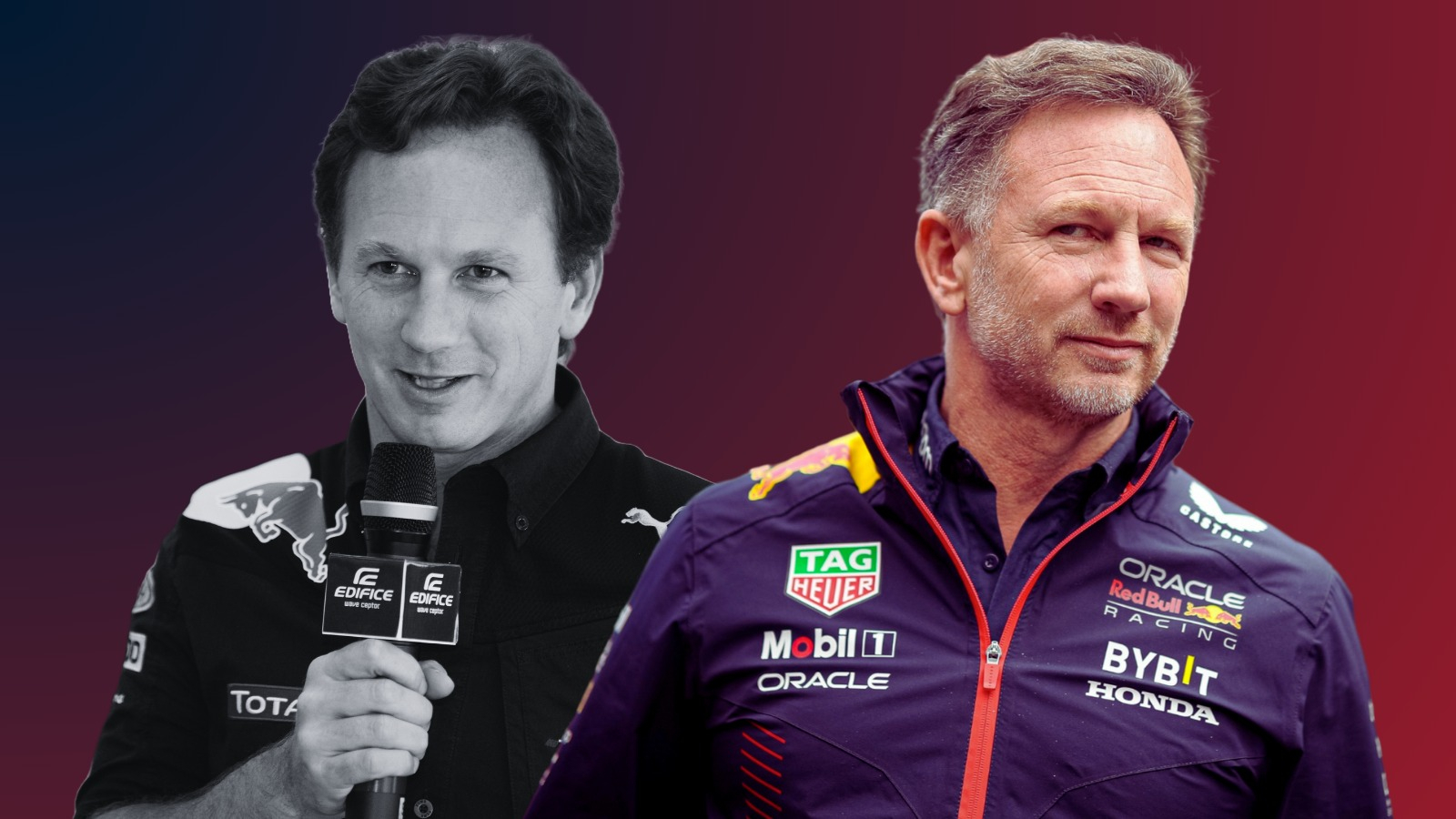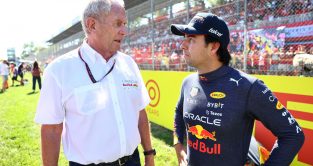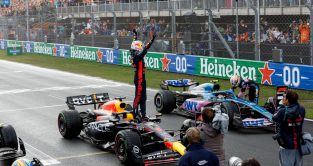Christian Horner exclusive: The secrets to F1 success and his Red Bull future

The life of a Formula 1 team principal is a fleeting existence.
Mike Krack was installed as Aston Martin boss in January 2022 and yet he already is the sixth longest serving in the paddock. Guenther Steiner is considered one of the veterans despite his team not even existing eight years ago.
While the quick hire and fire nature has previously been reserved for football, Formula 1 owners have to an increasing extent become trigger happy.
Otmar Szafnauer was the latest to fall, unable to agree on a timeline for Alpine’s ambitious project, while there are others up and down the paddock wondering if they may be next.
And yet, away from the revolving door, there are the rare exceptions. The ones that not only survive the intense heat of this particular pressure cooker but indeed, thrive off it.
When Franz Tost steps away from the paddock for the final time at the end of the season, he will do so 18 years after he first arrived as Toro Rosso team principal. 2023 saw Toto Wolff move into his second decade of Mercedes management but the longest serving boss is the very man Wolff is so desperate to catch.
“That’s a very good question,” Christian Horner tells PlanetF1.com when asked how he has survived so long. “I think I’ve never really changed the way I operate from when I came into the sport.
“A lot of different teams have different philosophies. I think one of our biggest assets and strengths here has been stability for them. If you look at any sporting team, stability always plays a key role, whether it’s Alex Ferguson at Manchester United or Arsene Wenger or across other sports as well.”
Horner is the great survivor of Formula 1. Appointed at the age of 31, he was three years younger than his senior driver and while he now no longer be the youngest, he has become one of the most successful bosses in Formula 1 history.
Away from the TV cameras, he speaks with a quiet tone, contemplating his answers carefully before he gives them. Horner has learnt the art of weaponsing speech but on this occasion his words are not made for headlines.
Sitting in the Red Bull team base trackside in Zandvoort, his appearance has changed dramatically since his day in the job. The medium-length scruffy brown hair has been trimmed, accompanied by a dash of grey as is his well kept beard. He sits, elbows on the table with a gold ring on his right little finger, TAG Heuer watch on his left wrist.
It exudes the air of the confidence of a man so assured in his role that he need not worry about feeling out of place but that was not always the case.
His first day on the job came in January 2005. Years of running his own Formula 3000 team had prepared him for motorsport management but Formula 1 was another level, the pinnacle of motorsport and a challenge beyond anything he attempted before.
It was also an era of larger than life characters perhaps not so willing to welcome the new kid on the block in charge of a team named after an energy drink looking to break into the motoring elite.
“I don’t think I could imagine what that journey was going to be like,” he says, recalling his first day at his desk. “It was a question of taking it one step at a time and just applying the same virtues of Arden in Formula 3000.”
Those virtues were laid out in an interview soon after he took the job. The need to do the basics well, keep your feet on the ground and make sure everyone is working in the same direction. Almost two decades later, that mantra has not changed.
“100%,” he said when reminded of his previous words. “It’s the biggest team sport in the world.
“每个人都在汽车和之间的共性performance of that car. It’s about everybody working for each other, supporting each other and working as a team, not as a bunch of individuals.
“It’s a people business. It’s about getting the right people, creating the right environment, the right culture, giving them the right tools and clear direction. In the early years it was about assembling that team and then delivering.”
And deliver he has. Red Bull have not just won titles but have done so in an all-conquering fashion. Sebastian Vettel’s 2013 triumph remains the biggest winning margin of any Drivers’ title and Max Verstappen is on course to break it this season.
It is not just titles that have a new owner but records too. The Hungarian Grand Prix saw the team win their 12th consecutive race, breaking the record of the 1998 McLaren team which Horner watched when he was “stil in small trousers.”
As well as the environment Horner has built there is also a relentless competitiveness that runs through it and that was the vision set out by late founder Dietrich Mateschitz.
“Dietrich Mateschitz had very lofty ambitions when he came into the sport,” Horner said recalling the man who passed away in October last year. “He didn’t want to just be a participant, he wanted to compete.
“When we came into the sport, there were so many manufacturers that were involved. I think it was eight manufacturers at a time and to come in as a privateer with customer engines was unheard of to be able to go on and compete and win races and then and then championships.”
Since he first sat behind the desk of an office that formerly belonged to Tony Purnell, he has shared the paddock with 44 different people but when he arrived, he found himself in meetings with some of Formula 1’s most legendary figures. Ron Dennis, Flavio Briatore, Jean Todt with Bernie Ecclestone and Max Mosley running the show.
Rather than feel intimidated by those around him, Horner felt privileged to be sharing a room with men who had left an irreversible mark on the sport.
“I had the privilege of seeing up close how some of the legendary leaders operated. When I first came into the sport Bernie Ecclestone and Max Mosley were running the business very tightly.
“Then there was Ron Dennis, there was Jean Todt, there was Flavio Briatore. Big personalities, big characters.
“I suppose the difference between now and then is that they were all quite entrepreneurial and they thought, bigger picture whereas now you see a bunch of managers in the room that are very short term.
“They are only focused on their little area rather than thinking more holistically so that’s been an interesting change.”
As for his approach, Horner opted to ignore the examples set by his peers.
“There’s nobody that I modelled myself,” the 49-year-old said. “I had a lot of admiration for them whether it was Ron or Frank or what Jean Todt did or Flavio in his flamboyant way.
“They’re all very different but the one commonality that they had was that they would do the best that they could for their team and assemble the right group of people together.”
Horner’s role has changed dramatically since his first arrival. In 2005, the Canadian Grand Prix saw the highest average viewership at 53 million worldwide, in 2022 that figure was up to 70 million.
It was a sign of just how much Formula 1 has exploded in popularity. 24 races have been scheduled for 2024 with all three days of a weekend often selling out. Netflix’sDrive to Survivetook the drivers from faceless men behind helmets to some of the most recognisable athletes on the planet. Horner himself was transformed from niche sports boss to the one of its biggest stars.
The Warwickshire born Briton’s race weekend is spent meeting hospitality guests, giving interviews and interacting with fans all while trying to juggle running a successful race team.
And it is not as if Horner shirks away from responsibility. While some teams prefer to split the roles, Horner is both team principal and CEO of not only the racing team but also a fledgling power unit division.
“Everything has just got bigger,” he said. “I’m now the team principal and CEO of effectively three entities in Red Bull Racing, Red Bull Powertrains and Red Bull Advanced Technology.
“We were 400 people when I first started. By the end of this year across all the groups, we will be 1,800 people so it’s just a much, much bigger beast.
“We were in two buildings at that time, now we’re in 18. I don’t think anybody could have envisaged the growth and the success that we’ve managed to achieve.
“As a CEO, you’re really responsible for the operation of the business, commercially, operationally. So if you like, that’s the Monday to Friday job.
“And then 24 weekends a year or 22 this year, you are the team principal of a high-performance sports team.
“People have chopped up the role in different ways. Some have a CEO, some have a team principal and some team principals are effectively sporting directors. So every team has a different job title for different individuals.”
There is not much left to achieve on Horner’s F1 bucket list. A sixth Constructors’ title and seventh Drivers’ title look almost assured. The Mercedes juggernaut that looked unbeatable in the late 2010s was not vanquished by regulation changes but instead their nosy neighbours 23 miles down the road.
So what next for the man so synonymous with this era of Formula 1? He is already the fourth-longest serving team principal of all time, 11 years behind Ron Dennis, and at the age of 51, he may well match the 43-year tenure of Sir Frank Williams.
“我从不倾向于未来看的那么远,”Horner responds when asked if he has an end date in mind.
“I enjoy what I do, I’m passionate about what I’m doing, I still have the same energy that I had 20 years ago when I came into this job, I’m still one of the younger team principals in the sport and I’ve got just as much motivation.
“The excitement for me is the next chapters for the team with our powertrains coming online in 2026. Our first track car being produced internally as well, the first ever Red Bull car. So there’s a lot going on within the group, within the business which is really exciting.”
PlanetF1.com recommends
F1 team principals: How long has each team boss been in charge?
F1 race wins: Which drivers have the highest win totals in F1 history?
And when that day does finally come, could Horner be tempted to another constructor? For a relationship that began 18 years ago, it should come as no surprise to his answer.
“I couldn’t see myself being with another team,” he said, leaning back in his chair. “I feel so involved, obviously, having been there since the beginning. Having built this team and working with such great people like Adrian [Newey] and so many great, great talents that we have throughout the business.
“我无法想象穿上不同的o型f shirt. My commitment is absolute that I’ll continue to do it for as long as I feel motivated and capable.”
It is the last sentence that should strike fear into other team principals’ hearts. The discussion of late has been when this Red Bull dominance will end but even when that inevitable point does come, with Horner at the helm you can’t imagine it will be long before they are back on top.
Read next:Explained: Why Red Bull are planning huge second team rebrand for F1 2024






